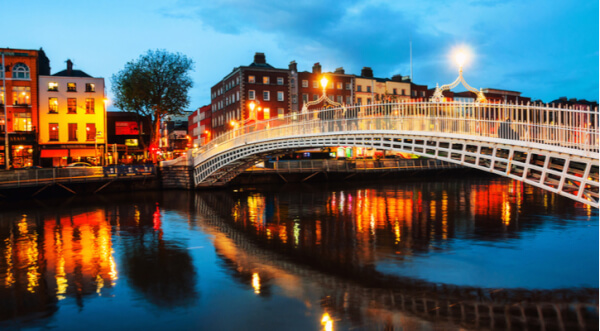Moving to Ireland from Australia
Looking to move to Ireland from Australia? We'll fill you in on the travel and visa requirements, healthcare, cost of living, pros, cons and much more.

Ireland shows an impressive commitment to public healthcare with over a third of its population entitled to free medical care. Though people who aren’t eligible for this often face a number of fees, and many choose to go private. If you’re making the move to Ireland, take a look through our guide to the country’s healthcare system.
The global exchange market fluctuates all the time, meaning that it’s hard to know exactly what your home currency is worth in terms of euros. For up-to-the-minute figures, you can use an online currency converter to see what your money’s worth.
At the time of writing, euros are worth approximately this much:
Public healthcare is free, in that you don’t have to pay into a specific state insurance policy: it’s primarily funded through taxation. And if you qualify for a Medical Card, almost all public medical services are free to use as well. If you don’t qualify for a card there are costs for general practitioner (GP) visits, hospital stays, drugs and some other services, although the rates are subsidised.
Certain services are on offer to everyone for free but you do have to sign up for them. The Drugs Payment Scheme limits the amount you have to spend on prescription drugs to €144 per month; the Long-Term Illness Scheme covers costs if you have a long-term condition; and the Maternity and Infant Care Scheme provides a lot of the medical costs that come with having children.
Here are the key costs if you don’t have a Medical Card:
| GP visit | On average, between €40 and €50 |
|---|---|
| Emergency room visit with a GP referral | Free |
| Emergency room visit without a GP referral | €100 |
| A night in hospital | €80 (with a yearly cap of €800) |
| Prescription drugs | €144 per month maximum (if you sign up for the Drugs Payment Scheme) |
There might be further costs related to hospital stays as well.
To make sure you have enough cash in case of a medical emergency, you’ll need to get your money into Ireland promptly. Wise can offer you the real exchange rate - the one you find on Google - rather than more expensive ones like the banks might offer and they also only charge a simple, upfront fee, so it could save you a lot. And with a Borderless account, you can hold money in euros, and up to 27 other currencies, even before you’ve moved there and set up a bank account. You can even get your own IBAN, so you can pay money in and out using euros, protecting you from the ever-changing currency market.
The Irish health insurance system has a few complexities. Simply put, public Irish healthcare is available for all. It’s primarily funded by taxation, meaning that you don’t have to take out a special policy to have access to it. However, only around 37% of the population has free public healthcare via a Medical Card with another 9% allowed to see their doctor for free with a GP Visit Card. Everyone else is liable to the subsidised fees listed above, meaning that it may be a universal system but certain services still lead to certain costs.
Because of both the fees and the possibility of long waiting times for public healthcare services, some 40% of Irish residents take out a private insurance policy - the highest percentage in Europe.
One group is an exception to the ‘public healthcare for all’ rule. Students from outside the EU have to take out private insurance - in fact, they need to do this in advance before getting their student visa.
Whether or not the state healthcare system works in your favour might hinge on one key question: if you’re eligible for a Medical Card or not.
As a brief overview, you’ll be eligible if you make less than a certain amount of money each week, although the exact figure varies depending on your circumstances. For example: for a single person on their own it’s €184 or less, but there’s a higher threshold if you have children. As well as income, other factors are included, such as rent and mortgage payments, travel expenses to work, and childcare - so it’s worth reading up on the details before deciding whether or not to apply.
People are also entitled to a Medical Card under various other conditions, including if costs would otherwise cause you ‘undue financial hardship’, or if you’re already insured with another EU country.
The GP Visit Card is for those who are just above the threshold for a Medical Card and allows you free GP visits but not the other benefits that come with a Medical Card. Anyone under 6 or over 70 can get one too. If you apply for a Medical Card and you are not eligible for one, then you will be automatically considered for a GP Visit Card instead - it’s the same process.
For full information, the place to go is the website of the official Irish health service, the Health Service Executive (HSE). They have detailed information on whether you’re eligible for a Medical or GP Visit Card, and information on how to apply for one.
If you can’t get a Medical Card, you’re liable for the costs outlined above. It’s still a lot less than healthcare in a private hospital costs, of course - but you still might want to consider the benefits of private healthcare insurance.
Private healthcare remains a popular option in Ireland, although numbers have fallen somewhat in recent years as insurance prices have increased.
It’s still an attractive offer though and not just because public healthcare often ends up costing something, but also because many policies will pay towards costs at private facilities, or even at Ireland’s several ‘high-tech’ hospitals. This is a great way to get around the long waiting times that can be typical if you have public healthcare.
Employers sometimes offer private healthcare schemes too, so it’s worth checking to see if this applies to you.
Only four companies offer private insurance in Ireland: Irish Life Health, Laya Healthcare, VHI Healthcare and HSF. Of those, three offer full private insurance, and HSF offers only cash benefit plans - a cheaper sort of coverage that gives you fixed costs back for certain healthcare expenses.
Private insurance is regulated by the Health Insurance Authority (HIA). Its website has a very helpful comparison tool, which is the place to go to find the right option for you - whether that’s full insurance or a cash plan.
You don’t need to sign up to be eligible for public healthcare, although if you’re moving to the country you may need to prove that you are or will be ‘ordinarily resident’ in Ireland and planning on staying for at least a year. Contact the Health Service Executive (HSE) about that to be sure.
To get many of the state system’s benefits, however, you do have to sign up. The HSE is the place to go for this. Here you can find out how to apply for a Medical or GP Visit Card and even if you’re not eligible for a card, do sign up for the Drugs Payment Scheme to make sure you never pay unaffordable amounts for drugs. If they’re applicable to you, it’s good to also sign up for the Long-Term Illness and Maternity and Infant Care schemes.
Step one for private insurance is the HIA and its comparison tool, as mentioned above - or perhaps talk to your employer.
Ireland has two identical emergency numbers: 112 and 999. Call one of these numbers if you think someone’s life is in danger. You’ll receive step-by-step advice on what to do and an ambulance will be sent out. It’s a great help to know your Eircode or postcode so they can easily pin down where you are.
If you can get yourself to the emergency room, it’s best simply to do that. Make sure you always know where your nearest one is as not every hospital has an emergency department. Private hospitals sometimes have emergency departments, but if you do choose to go to one, make sure you know what you’re going to do with the bill you’ll face. Check if it’s covered on your private health insurance plan, if you have one.
For less serious issues, try your GP, or an after-hours clinic at evenings or weekends. If you phone your GP outside office hours, the number should provide details of where else you can call. There’s also a list of out-of-hours services on the HSE site.
If you’re a visitor from the EU, you are permitted free medical treatment in emergencies if you have your European Health Insurance Card (EHIC) - make sure to carry it with you. UK nationals don’t even need the card. If you’re visiting from outside the EU, you’ll have to pay full costs though, so make sure to get travel insurance out before you go. There’s an exception for Australian visitors, though - if you’re visiting from Australia, you should be covered.
The average wait at an emergency room was recently put at over three hours, which puts it in last place Europe-wide.
Those long waiting times mean that private - or better still ‘high-tech’ - hospitals can be an attractive option in Ireland. That’s one of the reasons that private healthcare insurance remains popular.
Take care when choosing a private insurance policy, though, because different levels of insurance provide coverage at different categories of hospital: at the cheapest end of the scale, it’s possible to end up with a private health insurance policy that doesn’t cover you for treatment in a private hospital.
On the public system, it is just the emergency room visits and nightly fees that you’ll end up with, unless you’re there long-term, as well as possibly prescription drug costs. Other costs are covered by the state.
You have the right to choose your own GP and the HSE has a GP finder tool you can use to do this. Most GPs are technically part of the private system, which is why they charge a fee. Despite this, a majority of GPs do accept patients with Medical or GP Visit Cards. Do check when signing up, if this is relevant for you.
Value is placed on finding a GP who’s right for you, and it’s common to meet a doctor before signing up with them.
Call in advance if you need to set up a GP appointment as you can’t simply walk in and wait. They should try and accommodate urgent cases quickly, but still, it’s best to call ahead.
To see a specialist - usually called a consultant in Ireland - you’ll need a referral from your GP before you go the first time. There can be very long waiting lists - some people have to wait years.
As explained above, the Medical Card is a very good option for those on lower incomes. But a private healthcare plan is often a good way to ensure you have a high level of coverage. An average cost for an individual is around €1,925 per year (€160 per month) although it can be as low as €430 per year. Our complete guide to health insurance in Ireland has much more information on the available options.
As already mentioned, if you’re from the EU or Switzerland, a temporary visit to Ireland may already be included in your health insurance pan. Do check the details of your policy, though, and remember your EHIC.
If you’re coming from outside the EU, it’s crucial to have insurance because otherwise you’ll be liable for full costs. Take out a travel insurance plan if your standard medical insurance doesn’t cover trips abroad. Comparison sites such as Comparethemarket or MoneySupermarket might be able to help.
With a number of different options on the table, it’s important to know how much healthcare you’re entitled to in Ireland, including what you do and don’t pay for just through your taxes. Good luck in finding the system that’s right for you.
*Please see terms of use and product availability for your region or visit Wise fees and pricing for the most up to date pricing and fee information.
This publication is provided for general information purposes and does not constitute legal, tax or other professional advice from Wise Payments Limited or its subsidiaries and its affiliates, and it is not intended as a substitute for obtaining advice from a financial advisor or any other professional.
We make no representations, warranties or guarantees, whether expressed or implied, that the content in the publication is accurate, complete or up to date.

Looking to move to Ireland from Australia? We'll fill you in on the travel and visa requirements, healthcare, cost of living, pros, cons and much more.

Child maintenance in Ireland is complicated — read on to learn what you need to know.

Having a baby is a priceless experience, but if you’re a foreigner in a different country, it can be daunting to navigate new healthcare systems and impending...

Ireland is known for its love of food and drink, picturesque countryside and bustling cities. Read on to find out the pros and cons of living in Ireland.

Roaming around Ireland is the fantasy of many, driving through the beautiful green countryside and stopping for a pint in any of the country’s quaint small...

If you’re an expat living in the Republic of Ireland, you might be considering taking up an Irish citizenship. There are some clear benefits to this. Becoming...